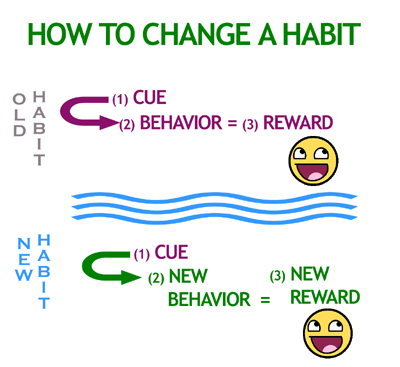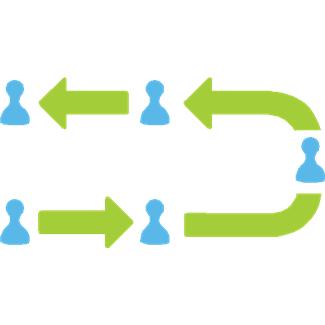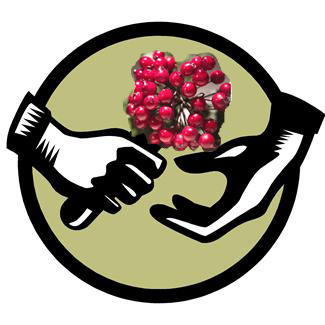Habit Change: Solving Not Complaining
HABIT CHANGE: SOLVING NOT COMPLAINING (ISSUE 108)
By Diane Gold
All of us have developed the habits of solving and complaining. The very assertive yet ineffective method of complaining has been reinforced into our beings since our families and our teachers said,
 “Speak out,”
“Speak out,”
without giving us parameters about what that meant in terms of effect and solution. Many of us thought it meant speak about a topic, and point out what’s wrong with nothing further. Informing is a crucial part of the process, but it is not enough. Once we have informed, we have to start a path to solution, if solution is our goal. Speech
Because society keeps changing and each generation latches on to slogans, I remember,
“Question authority.”
The point of this commandment was to get us to think, communicate, create and solve. However, many people neglected to encourage the create and solve mechanisms necessary for us to accomplish change and allowed us to gossip, nag, criticize, whine and moan since this piece of the speaking out concept occurs without much effort.
The slogan, as I see it, was meant to stimulate the mind into founding new solutions. Parents wanted children to think for themselves and accept not what others fed them without critical thinking and deduction.
 What transpired for various reasons has been a culture of speakers with no solutions, many just “orating for ego” (good T-shirt). Since there has not been a focus solving vs. complaining in modern times, it is more common to hear groups of complainers than groups of problem solvers. Plus, it’s more difficult to create than to condemn (another good T-shirt, “create, don’t condemn”).
What transpired for various reasons has been a culture of speakers with no solutions, many just “orating for ego” (good T-shirt). Since there has not been a focus solving vs. complaining in modern times, it is more common to hear groups of complainers than groups of problem solvers. Plus, it’s more difficult to create than to condemn (another good T-shirt, “create, don’t condemn”).
HABIT CHANGE, FROM COMPLAINING TO SOLVING
 In order to solve vs. complain, we follow the process for any habit change: cue, replace the old action, reward.
In order to solve vs. complain, we follow the process for any habit change: cue, replace the old action, reward.
In the old scenario, we saw something we disagreed with (the cue or trigger that sets off the action).
We went on our internet radio show (well, not when I was young) and complained or preached about it (the action).
We felt good because we had talked (the reward), but what we saw as wrong did not change.
In the new scenario, we see something with which we disagree (the cue, same as original).
We have a pre-planned new activity such as going to a focus group strictly to work on a solution (the new action).
We feel good because we have created or are on the path to creating a viable solution to the issue (the reward).
THE ACTION (AFTER THE CUE, IN ORDER TO GET THE REWARD)
Of course, it is important to communicate our thoughts, desires, opinions. Exclusively talking about the wrongs, the negatives, the bad situations may bolster our egos or get us into a clique, but it deludes us into feeling accomplished and obstructs our path toward solution.

What if all the people in our clique used our wonderful brain power to brainstorm about how to solve something? We would use up the same amount of time and energy. We would be sharing ideas that could sprout into solutions. True, we would expose ourselves to ridicule if our clique did not agree with our solutions. But, creating a solution is what everyone wants, right?
If we truly believe in an idea, we will want it to have a result. This means acting toward moving it forward.
We can ask,
“If I could be instrumental in solving a national feud through some super technique, would you want me to talk about how terrible war is or would you want me to administer the technique so that we could accomplish cooperation and harmony?”
Or,
“If we all had a loved one who was sick from a disease, would you want me to talk about how terrible the pharmaceutical industry is or would you want the cure to the disease?”
Or, let’s get personal.
“If you had nightmares, would you want me to talk about how many illegitimate techniques offer to alleviate them or would you want that one super relaxation technique that stopped nightmares?”
SYSTEMATIC APPROACH
I’m pretty sure we would all rather have a solution than to hear the story about the problem, rather than the process for solving it. I’m also pretty sure we all have many useful ideas that can turn into brilliant formulations toward solving or beginning to solve a situation or preparing a solution. All we need is a systematic approach to discovering a solution. In order to limit the possibility that we go off track, we could employ the following systematic approach: 
1) Use no statements that self-aggrandize.
2) Make no judgments when an idea is brought to the table.
3) Minimize kvetching (Yiddish word for complaining) as soon as it arrives out of our mouths.
4) Keep doing it. Place as much energy on solving as we have on complaining; and we will make a difference.
CONCLUSION
 Now that we are evolved enough to understand this, it is time to consider the solution process with every speech. We may have to change our habit, if we are used to being critical, not constructive. We can certainly slap the wrist of education for lack of emphasis on oration without solution. And we can change how we educate from now on.
Now that we are evolved enough to understand this, it is time to consider the solution process with every speech. We may have to change our habit, if we are used to being critical, not constructive. We can certainly slap the wrist of education for lack of emphasis on oration without solution. And we can change how we educate from now on.
I am reminded of the 2013 engineering toy for girls, built on the premise that girls need engineering concepts as do boys. This toy is breaking the gender-biased stereotypical mold that girl toys should be dolls and boy toys should be construction sets. The creator, whose training is in engineering, saw the need and created the solution. She could still be talking about it, but she executed a solution and talks about that.
In the same way, educators can start forming the creative solution process at very young ages. And families that encourage their children to speak out can back that up with the importance of solving, rather than complaining.
ACTION STEPS
Here is a process for creating a solution. Do it to see what happens. Using a simple process of writing down the first 5-10 things that come into your head, come up with your own process for the scenario in 1):
1) Family 1 lives on 1 side of the river. Family 2 lives on the other side of the river. Each family has had one of their family members hurt by the other family as a result of war or land disputes, and the families currently have sworn animosity toward each other.
Family 1 needs a special berry that grows on Family 2’s side. Family 2 needs a special root that grows on Family 1’s side. Both the root and the berry will save lives, but the families do not speak to each other. 
What process can we offer the families to start talking again, and how can they curb their hate?
2) Email us your process. It will be kept anonymous.
3) To get thinking about solutions, not complaints, let us know how you would respond to the following:
a) On a scale of 1 to 10, 10 being a lot, how much do you believe you can make a difference of any size in your community?
b) On a scale of 1 to 10, 10 being a lot, how much would you like to contribute to human rights and social harmony?
FEEDBACK
Please leave a comment and LIKE.
DIANE GOLD, AUTHOR
Diane Gold, Founder of Warriors of Weight, Turning Habits Into Health, is a mentor in tai chi, kung fu and meditation, a music, fitness and stress expert, dedicated mom, studying plant-based nutrition and habit change.
She knows from personal experience how easy it is to get caught up in opinion sharing which can take people away from creating solutions. She says,
“It’s pretty natural to speak out when we see wrong. Especially if we were encouraged to do so as kids. Based on all the speakers and regular folk who are complainers, we, as parents, and the education system from which we come, did not appropriately teach that solutions are a large and necessary follow up to any criticism. Without it, we are just exercising our mouths.
“Solutions are scary because we do not have a whole crowd around us when we are the solution creator and sole discoverer. When we complain, there are always people who can relate to our complaint. But when we solve, this leaves us completely vulnerable to disapproval and social scorn. Which is part of why we gravitate toward complaining and not solving, in the first place.
“Let’s make sure, from now on, we show by example that we devote as much energy to solving a situation as we do discussing what needs solving. This will guarantee positive direction for all humanity.”







